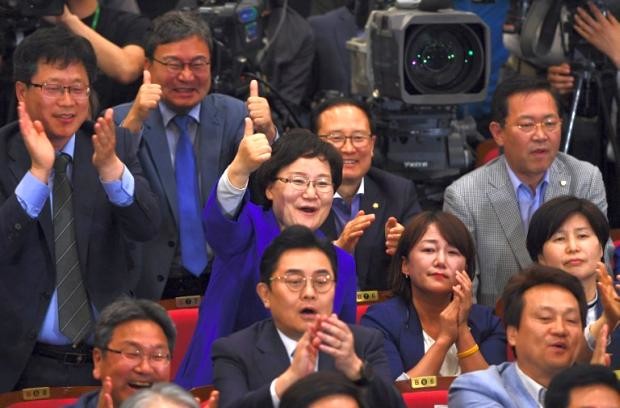Exit poll: Landslide win for Moon in South Korea election

South Korea’s Democratic Party members react as they watch TV screens showing the result of exit polls of the presidential election at a hall of the National Assembly in Seoul on May 9, 2017. Left-leaning former human rights lawyer Moon Jae-in of the Democratic Party won South Korea’s presidential election by a landslide, an exit poll predicted when polls closed on May 9.(Photo by JUNG YEON-JE / AFP)
SEOUL, South Korea — Left-leaning former human rights lawyer Moon Jae-In won South Korea’s presidential election by a landslide, an exit poll predicted when voting closed Tuesday.
The election was called to choose a new president after Park Geun-Hye was ousted and indicted for corruption, and took place against a backdrop of high tensions with the nuclear-armed North.
Voters were galvanized by anger over the sprawling bribery and abuse-of-power scandal that brought down Park, which catalyzed frustrations over jobs and slowing growth.
They gave Moon, of the Democratic Party, who backs engagement with the North, 41.4 percent support, according to the joint survey by three television stations. Conservative Hong Joon-Pyo – who dubs Moon a “pro-Pyongyang leftist” was far behind on 23.3 percent, with centrist Ahn Cheol-Soo third on 21.8.
“I feel the people’s strong will to change the government… we can make it a reality only when we vote,” Moon said after casting his ballot with his wife in western Seoul.
National elections are public holidays in South Korea and a record turnout was expected, with 75.1 percent of voters casting their ballots by 7:00 pm, an hour before the polls closed, just below the final turnout of five years ago.
Kim Sun-Chul, 59, said he voted for Moon because “this country needs to restore democracy which has been so undermined by the Park government.”
The campaign focused largely on the economy, with North Korea less prominent, but after a decade of conservative rule a Moon victory could mean a sea change in Seoul’s approach towards both Pyongyang and key ally Washington.
The 64-year-old – accused by his critics of being soft on the North – has advocated dialogue to ease tensions and to bring it to negotiations. He is seen as favoring more independence in relations with the US, Seoul’s security guarantor with 28,500 troops in the country.
Their presence, he told reporters during the campaign, was “important not only to our own security but also to the global strategy of the US.”
The North has carried out two nuclear tests and a series of missile launches since the start of last year in its quest to develop a missile capable of delivering a nuclear warhead to the US mainland.
Washington has said military action is an option, sending fears of conflict spiralling.
More recently US President Donald Trump has softened his message, saying he would be “honored” to meet the North’s leader, Kim Jong-Un.
Moon also says he would be willing to visit Pyongyang to meet Kim and advocates resumption of some of the inter-Korean projects shuttered by his predecessors, including the Kaesong joint industrial zone.
In Seoul’s prosperous Seocho district, 72-year-old doctor Chung Tae-Wan backed Moon’s conservative opponent Hong, telling AFP he did so because “security is the most important thing.”
Acute division
But for many South Korean voters, corruption, slowing growth, unemployment and even air pollution from China top the list of concerns.
South Korea’s rapid growth from the 1970s to 1990s pulled a war-ravaged nation out of poverty but slowed as the economy matured, and unemployment among under-30s is now at a record 10 percent.
Frustration over widening inequality in wealth and opportunities fueled anger over Park’s scandal, which exposed the cosy and corrupt ties between regulators and powerful family-oriented conglomerates, known as chaebols, that have endured for decades.
Park is awaiting trial over corruption for offering governmental favors to top businessmen – including Samsung heir Lee Jae-Yong – who allegedly bribed her secret confidante, Choi Soon-Sil.
Moon, Ahn and other candidates promised to reform the chaebols, which dominate the economy and have long been criticized for operating with little scrutiny.
Another issue is relations with top trading partner Beijing, which imposed a series of measures seen as economic retaliation over the deployment of a US anti-missile system, THAAD, in the South.
In an election day editorial, the JoongAng daily said South Korea had been left “adrift” by the “acute division and lack of national leadership” stemming from the corruption scandal and Park’s impeachment.
The vote, it said, was a “great opportunity to put the troubled nation back on track.”